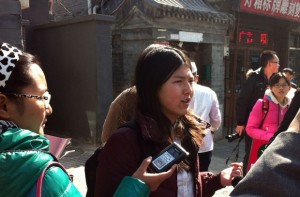 An Excerpt from “China’s Millennials: The Want Generation”
An Excerpt from “China’s Millennials: The Want Generation”
Eric Fish March 16, 2015
Provided
Li Tingting is interviewed by members of the media during the Occupy Men’s Room demonstration in 2012.
On March 6, Chinese police detained a group of feminist activists ahead of International Women’s Day. Five of them, remain in criminal detention on suspicion of “picking quarrels and causing a disturbance,” a crime frequently invoked to silence dissent in China that can carry heavy prison sentences. The activists planned to distribute stickers on public transportation calling on police to do more to fight sexual harrassment. One of the women who remains in custody, Li Tingting, is the subject of the following chapter excerpted from Eric Fish’s forthcoming book, China’s Millennials: The Want Generation. —The Editors
It is probably fair to say no woman has ever taken more flak for walking into a men’s room than Li Tingting.
In the run-up to Women’s Day in 2012, the feminist college student was distressed by the one-to-one ratio of public restroom facilities for males and females. She believed that women’s longer wait times necessitated legislation to enforce giving women twice as many toilets. Determined to correct the oversight, she organized demonstrations for true “toilet parity.”
The “Occupy Men’s Room” movement involved some 20 women who took over male public restrooms periodically over the course of an hour in Guangzhou and Beijing. Outside they distributed fliers and held signs with slogans like “Care for women, starting with toilets.”
The two events were small and cheeky, causing no more trouble than a little embarrassment for a few men. Most onlookers just laughed it off and expressed support for the cause. Li Tingting did not figure that her action could draw the wrath of authorities. She could not have been more wrong.
“We didn’t think it was sensitive,” she laughed. “But I guess we can’t gauge the risk since the government is so strange.”
When I met Li a year after her “Occupy” movement, I could not help but find it amusing that she had been considered a threat by China’s vast “stability maintenance” apparatus. Whether the petite 24-year-old was recounting one of her quirky demonstrations or the childhood beatings she had endured, she ended nearly every thought with a mischievous giggle.
Li was born in the rural outskirts of Beijing. She described her mother as a sweet and caring woman who had endured pain her entire life. Her father, on the other hand, she labeled a stubborn chauvinist.
